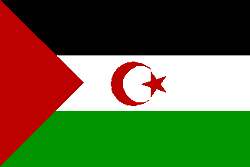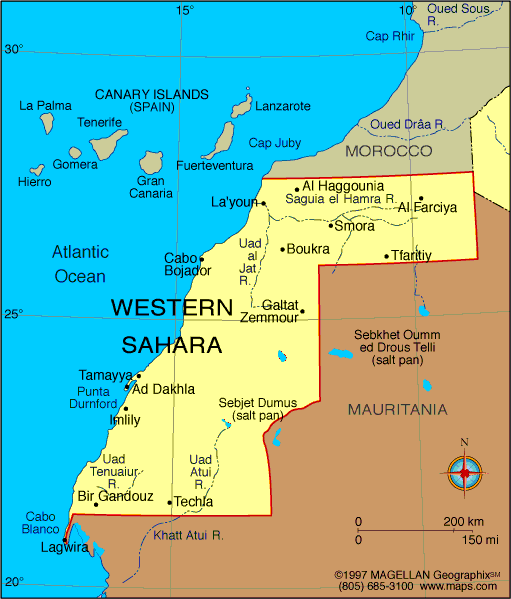WESTERN SAHARA

Geography: Located in northern Africa on the Atlantic Ocean, Western Sahara is surrounded by Algeria to the east, Morocco to the north, and Mauritania to the south. About the size of Colorado, it is mostly low, flat desert with some small mountains in the south and northeast.
Government: Legal status of the territory is disputed and sovereignty unresolved; a UN referendum on the issue is planned. The territory is contested by Morocco and the Polisario Front, which in Feb. 1976, formally proclaimed a government-in-exile of the Saharawi Arab Democratic Republic, now officially recognized by about 55 countries.
History: Little is known about Western Sahara before the 4th century B.C., when trade with Europe began. During the Middle Ages it was occupied first by Berbers and then by the Arabic-speaking Muslim Bedouins. In the 19th century the Spanish laid claim to the southern coastal region, called Rio de Oro, and later occupied the northern interior region, Saguia el Hamra, in 1934. The Spanish formally united the two regions, and it became known as Spanish Sahara in 1958. Both Morocco and Mauritania sought to control the territory, and when the Spanish departed in 1976, they divided the territory between them. In the meantime, the indigenous Saharawis began fighting for independence. In 1976, the insurgents, called the Polisario Front, declared a government-in-exile (the Saharawi Arab Democratic Republic) from their base in Algeria. Mauritania reached a peace agreement with the Polisario in 1979, but Morocco then seized the land given up by Mauritania and now exerts administrative control over the entire region. The Polisario Front fought Morocco to a stalemate and agreed in Sept. 1991 to a cease-fire, which was contingent on a referendum regarding independence. For more than a decade, however, the UN has failed to hold the referendum; disputes over voter eligibility have been the major stumbling block, as well as Morocco's opposition to the referendum. In Aug. 2001, former secretary of state James A. Baker, special UN envoy to the Western Sahara, proposed that instead of a referendum on independence, Western Sahara consider becoming an autonomous region of Morocco. The Polisario rejected the new proposal, which it saw as a reversal of the UN's decadelong promise to hold a referendum on self-determination. In 2002, King Mohammed VI of Morocco reasserted that he will not “renounce an inch of” the Western Sahara.
In Aug. 2003, a UN Security Council resolution adopted a new peace plan that would turn Western Sahara into a semiautonomous region of Morocco for five years, after which a referendum would be held to determine independence, autonomy, or integration into Morocco. The Polisario agreed to the plan; Morocco refused to consider it. In June 2004, a frustrated James Baker resigned after seven years as UN envoy. His successor has vowed to achieve a resolution. The UN has spent more than $600 million on peacekeeping efforts in Western Sahara over the last 13 years.
In Aug. 2005, the Polisario freed the last Moroccan prisoners it had been holding. The 404 men had been imprisoned for almost 20 years and were the world's longest-held prisoners of war.
Government: Legal status of the territory is disputed and sovereignty unresolved; a UN referendum on the issue is planned. The territory is contested by Morocco and the Polisario Front, which in Feb. 1976, formally proclaimed a government-in-exile of the Saharawi Arab Democratic Republic, now officially recognized by about 55 countries.
History: Little is known about Western Sahara before the 4th century B.C., when trade with Europe began. During the Middle Ages it was occupied first by Berbers and then by the Arabic-speaking Muslim Bedouins. In the 19th century the Spanish laid claim to the southern coastal region, called Rio de Oro, and later occupied the northern interior region, Saguia el Hamra, in 1934. The Spanish formally united the two regions, and it became known as Spanish Sahara in 1958. Both Morocco and Mauritania sought to control the territory, and when the Spanish departed in 1976, they divided the territory between them. In the meantime, the indigenous Saharawis began fighting for independence. In 1976, the insurgents, called the Polisario Front, declared a government-in-exile (the Saharawi Arab Democratic Republic) from their base in Algeria. Mauritania reached a peace agreement with the Polisario in 1979, but Morocco then seized the land given up by Mauritania and now exerts administrative control over the entire region. The Polisario Front fought Morocco to a stalemate and agreed in Sept. 1991 to a cease-fire, which was contingent on a referendum regarding independence. For more than a decade, however, the UN has failed to hold the referendum; disputes over voter eligibility have been the major stumbling block, as well as Morocco's opposition to the referendum. In Aug. 2001, former secretary of state James A. Baker, special UN envoy to the Western Sahara, proposed that instead of a referendum on independence, Western Sahara consider becoming an autonomous region of Morocco. The Polisario rejected the new proposal, which it saw as a reversal of the UN's decadelong promise to hold a referendum on self-determination. In 2002, King Mohammed VI of Morocco reasserted that he will not “renounce an inch of” the Western Sahara.
In Aug. 2003, a UN Security Council resolution adopted a new peace plan that would turn Western Sahara into a semiautonomous region of Morocco for five years, after which a referendum would be held to determine independence, autonomy, or integration into Morocco. The Polisario agreed to the plan; Morocco refused to consider it. In June 2004, a frustrated James Baker resigned after seven years as UN envoy. His successor has vowed to achieve a resolution. The UN has spent more than $600 million on peacekeeping efforts in Western Sahara over the last 13 years.
In Aug. 2005, the Polisario freed the last Moroccan prisoners it had been holding. The 404 men had been imprisoned for almost 20 years and were the world's longest-held prisoners of war.

Map of Western Sahara
Total area: 102,703 sq mi (266,001 sq
km)
Population (2013 est.): 554,795
(growth rate: 2.89); birth rate: 30.71; infant mortality rate: 56.09;
life expectancy: 62.27; density per sq mi: 5
Largest city (2010 est.): El Aaiun 196,331
Monetary unit:
Tala
Languages:Standard Arabic (national), Hassaniya Arabic, Moroccan Arabic
Ethnicity/race: Arab, Berber
Religion: Islam
Economic summary: GDP/PPP:
$906.5 million (2007 est.) Inflation: n.a. Arable land: 0.02%. Agriculture:
fruits and vegetables (grown in the few oases); camels, sheep,
goats (kept by nomads); fish. Labor force: 144,000 (2010 est.); animal
husbandry and subsistence farming 50%. Industries: phosphate
mining, handicrafts. Natural resources: phosphates, iron ore.
Exports: n.a.: phosphates 62%. Imports: n.a.: fuel for
fishing fleet, foodstuffs. Major trading partners: Morocco
claims and administers Western Sahara, so trade partners are included
in overall Moroccan accounts.
Communications: Telephones: main lines in
use: about 2,000 (1999 est.); mobile cellular: 0 (1999). Radio
broadcast stations: Morocco's state-owned broadcaster,
Radio-Television Marocaine (RTM), operates a radio service from Laayoune
and relays TV service; a Polisario-backed radio station also broadcasts
(2008). Radios:
56,000 (1997). Television broadcast stations: n.a.
Televisions: 6,000 (1997). Internet Service Providers
(ISPs): 1 (2000).
Transportation:
Railways: 0 km. Highways: total: 6,200 km; paved: 1,350 km;
unpaved: 4,850 km (1991 est.). Ports and harbors: Ad Dakhla,
Cabo Bojador, Laayoune (El Aaiun). Airports: 6 (2013).
International disputes:
Many neighboring states reject Moroccan administration of Western
Sahara; several states have extended diplomatic relations to the
"Sahrawi Arab Democratic Republic" represented by the Polisario Front in
exile in Algeria, while others recognize Moroccan sovereignty over
Western Sahara; approximately 90,000 Sahrawi refugees continue to be
sheltered in camps in Tindouf, Algeria, which has hosted Sahrawi
refugees since the 1980s.
-------------------- o --------------------
No comments:
Post a Comment